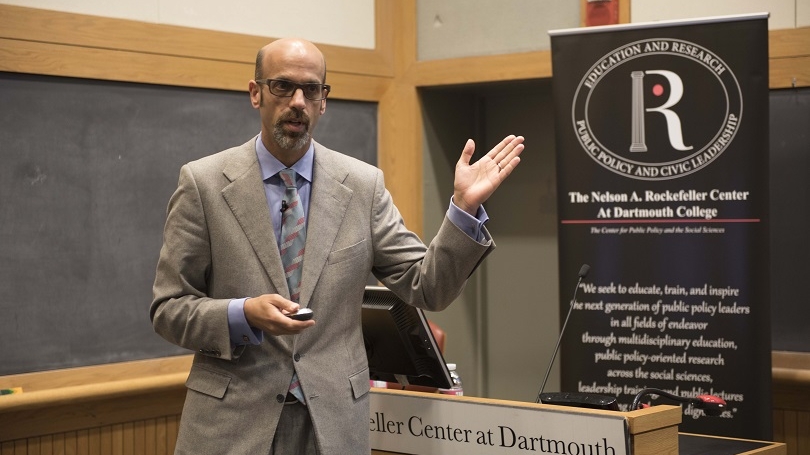
- Public Policy
- Leadership
- Funding
- News & Events
- About the Center
Back to Top Nav
Back to Top Nav
Back to Top Nav
Back to Top Nav
Aristocracy and meritocracy are commonly considered opposed, even opposite, ideals. According to the common view, aristocracy is entrenched in fixed accidents of birth, while meritocracy promotes equality of opportunity among all people. With respect to the workforce, the prevalence of aristocracy over meritocracy can lead to inequality of income and work opportunities. In today’s society, it may even be the case that what we perceive to be a meritocracy confers an unjust allocation of advantage upon those who are considered to have merit.
Yale Professor of Law Daniel Markovits spoke to this ideological tension in a lecture titled “Meritocracy and Its Discontents” on Thursday, April 21, 2016 at the Rockefeller Center. He addressed the concept of meritocratic achievement as it exists in contemporary society, and compared it to the virtue of aristocracy that was acclaimed in ancient times. He discussed how modern meritocracy has transformed the character of income inequality, and how the hyper-meritocracy that has developed in the United States has transformed the meaning of the concept of merit.
Daniel Markovits is Guido Calabresi Professor of Law and founding director of the Center for the Study of Private Law at Yale Law School. He works in the philosophical foundations of private law, moral and political philosophy, and behavioral economics. He has written articles on contract, legal ethics, distributive justice, democratic theory, and other-regarding preferences. Markovits concentrates, in each area, on the ways in which legal orderings engage the human instinct in favor of sociability to sustain cooperation even among persons who pursue conflicting interests and endorse competing moral ideals.
After earning a B.A. in Mathematics, summa cum laude from Yale University, Markovits received a British Marshall Scholarship to study in England, where he was awarded an M.Sc. in Econometrics and Mathematical Economics from the L.S.E. and a B.Phil. and D.Phil. in Philosophy from the University of Oxford. Markovits then returned to Yale to study law and, after clerking for the Honorable Guido Calabresi, joined the faculty at Yale.
Submitted by Marie Plecha ’16, Rockefeller Center Student Program Assistant for Public Programs
The views and opinions expressed and any materials presented during a public program are the speaker’s own and do not necessarily represent the views and opinions of the Rockefeller Center or constitute an endorsement by the Center.